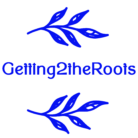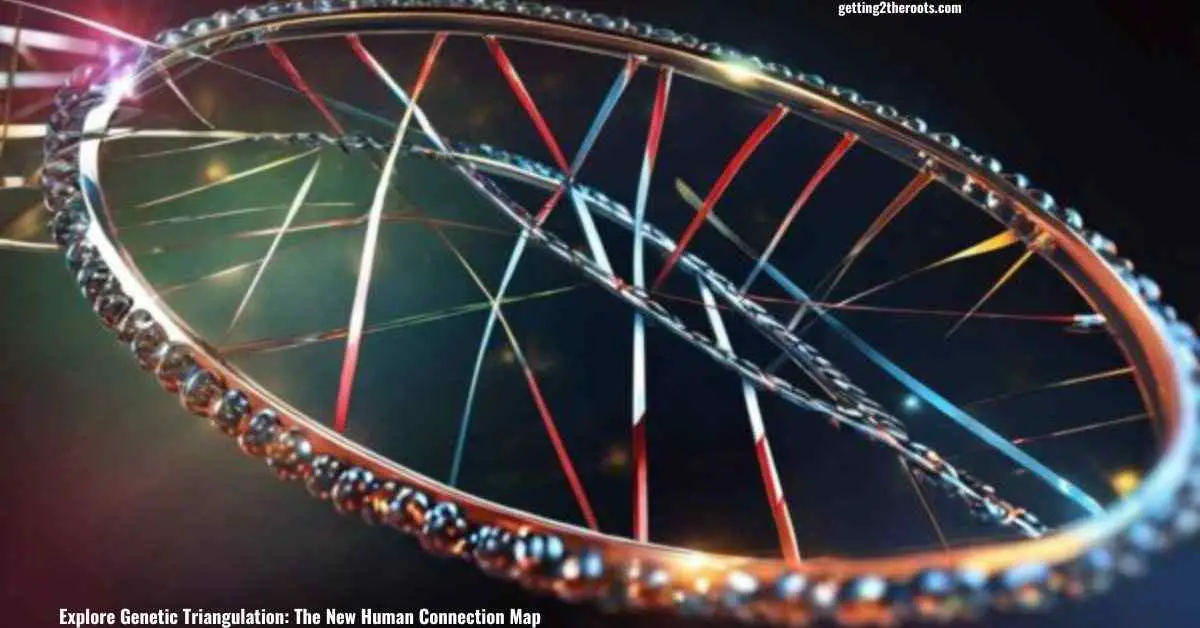Genetic Triangulation, an advanced method in the intricate world of genetics, unveils countless secrets about our past, present, and future.
This technique meticulously probes into our genetic blueprint, intricately unraveling the complex connections that bind us.
While complex, it provides definitive proof of genetic relationships, proving to be an indispensable tool in genealogical studies.
It also sheds light on the idea of genetics and opens the door to a full understanding of genetic triangulation, its effects, ethical issues in genealogy, and guesses about how it might change in the future.
You may also find value in our related articles, “The Best DNA Testing Companies For Finding Ancestors” and “Understanding and Utilizing Your DNA Test Results,” which offer further insights into the fascinating world of genetic discovery.
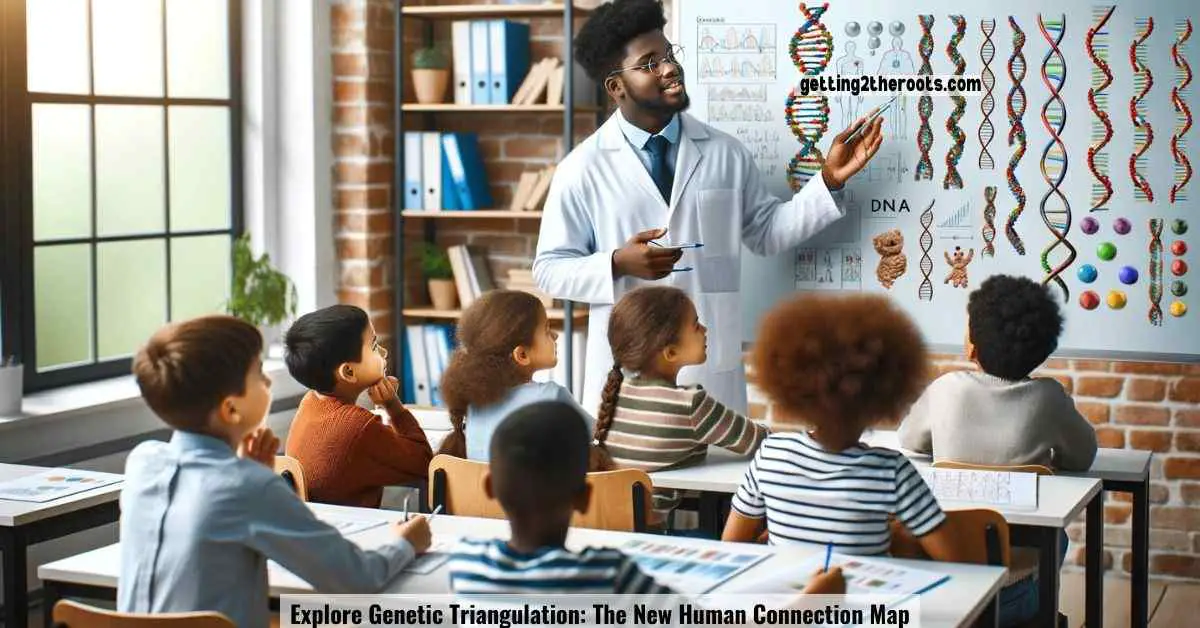
Understanding Genetics and Genetic Triangulation
Genetics: A Profound Study of Life’s Blueprints and the Role of Genetic Triangulation
In modern-day biology, the concept of genetics is no less than a well-woven tapestry, narrating the intricacies and complexities of life.
It is an in-depth field discussing how organisms, be they plants, animals, or humans, obtain their physical and behavioral characteristics from their ancestors.
The Genetic Code And Heredity
Genetics, essentially synonymous with heredity, is the study of genes—the part of the cell containing the genetic code that dictates the biological constitution.
Each gene carries a distinct sequence of DNA (deoxyribonucleic acid), the molecular blueprint of life.
DNA molecules, with their intricate thread-like structure, carry the guiding instructions for the:
- Development,
- Growth,
- Reproduction of every living organism,
It is this genetic code that passes on particular traits from one generation to another.
Expanding Understanding Through Genetic Triangulation
However, the small-scale transfer of genes doesn’t fully illuminate the broad expanse of genetics. It is the role of genetic triangulation that provides a more expansive view of our complex ancestry.
This method goes beyond the two-parent gene supply, incorporating the broader network of kinship, introducing a third point of reference to map and understand the genetic links.
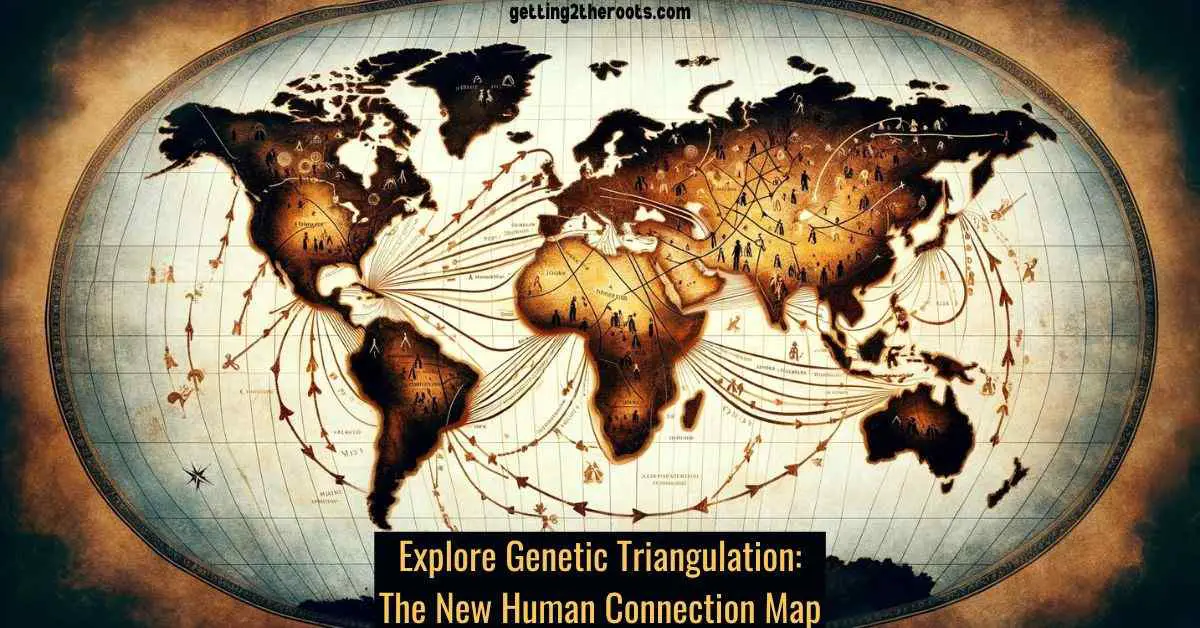
Genetic Triangulation In Ancestral Research
Genetic triangulation is a distinctive tool used in the investigation of ancestral relationships. It leverages autosomal DNA, the vast majority of DNA that does not determine sex, to trace back lineage beyond the constraints of direct parental lineage.
By comparing the DNA patterns of three individuals, genetic triangulation can validate or disqualify the assumption of common ancestry, providing a more nuanced and accurate depiction of genetic associations.
The Process And Effectiveness Of Triangulation
The process operates by comparing the DNA of three people who match on the same segment of an autosome.
If all three inherited that particular piece of DNA from the same ancestor, it’s said they triangulate on that segment.
This process is ascertained through phased data, distinguishing which DNA segments are inherited maternally and paternally.
If you’re particularly interested in uncovering details about your paternal lineage, such as tracing your father or grandfather’s ancestral roots, we have a tailored article for you. We recommend reading “Secrets of Paternal Lineage DNA.”
This resource is dedicated to guiding you through the intricacies of paternal DNA analysis, helping you unlock the stories encoded in your Y-chromosome.
Whether you’re a genealogy enthusiast or just beginning your journey into family history, this article offers valuable insights and tips for exploring your paternal heritage.
Genetic Triangulation In Genealogy And Anthropology
In genetic genealogy, triangulation methods play a crucial role and have proven effective in corroborating ancestral connections, ensuring a clear and more precise understanding of one’s lineage.
Genealogists and biological anthropologists often resort to this method to discover and confirm the genetic bridges between distant relatives with common genetic segments and track down the heritage trail.
The Significance Of Genetic Triangulation In Modern Genetics
In the rapidly developing field of genetics, where a single strand of DNA can unveil a lifetime of secrets, genetic triangulation serves as a pivotal tool.
As we continue to plumb the depths of our biological beings and ancestors, the intricate mosaic of genetic transfer looms ever larger, illuminating the trails of human life and evolution.
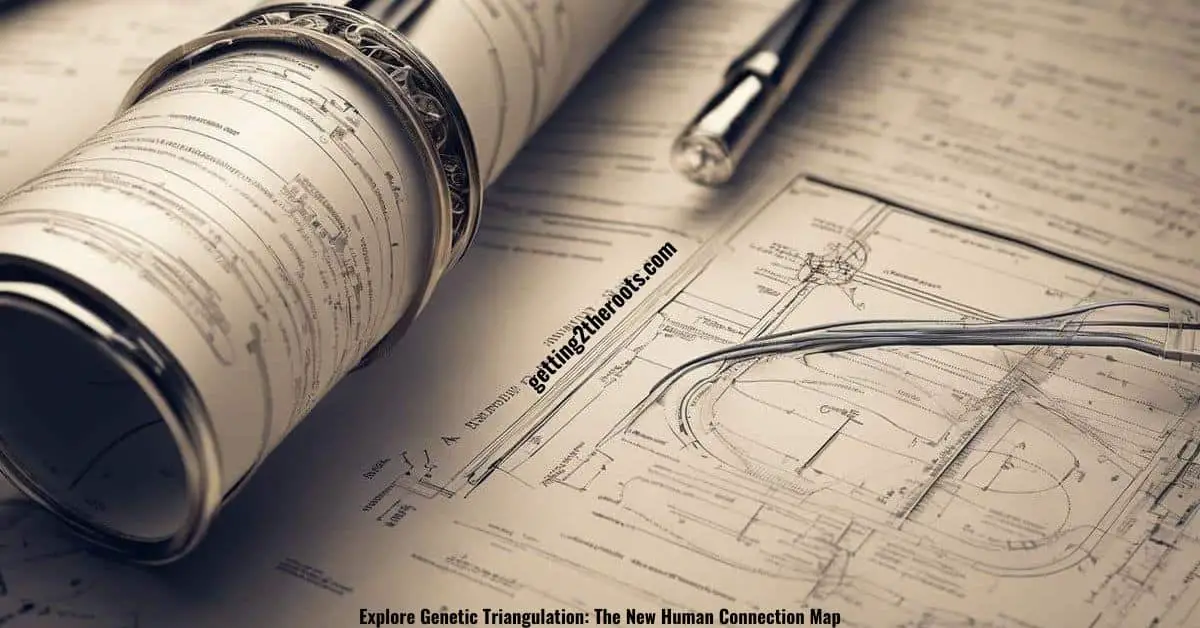
The Impact of Genetic Triangulation on Genealogy
The Remarkable Transformation of Genealogical Studies through Genetic Triangulation
The pursuit of familial understanding based on genetic information is a powerful catalyst supporting the relentless advancement of human knowledge.
Nowhere has this been more exemplified than in the adoption of genetic triangulation, a cornerstone technique in genealogical research that has profoundly transformed the field.
Genetic Triangulation In Autosomal DNA Navigation
As a tool on the frontiers of deductive science and technology, genetic triangulation navigates the intricacies of autosomal DNA, encompassing both maternal and paternal lineage, to unearth links that may lie hidden across multiple generations.
What once was an overwhelming task—establishing familial bonds beyond immediate bloodlines—has been taken over by the immense precision enabled by genetic triangulation.
Unlocking Ancestral Secrets Through DNA Segments
DNA segments inherited from the common ancestors of three or more individuals provide a treasure trove of data that strengthens hypotheses regarding common ancestry.
Through establishing the convergence of specific DNA segments among these individuals, putative genealogical relationships can be either validated or invalidated.
Among its many benefits, genetic triangulation breaks down old barriers in genealogy and explores uncharted areas of pedigree analysis.
Phasing Data With Genetic Triangulation
Genetic triangulation’s invaluable role in phasing data is another groundbreaking example of its mechanism.
Oftentimes, preliminary analysis of autosomal DNA struggles to discriminate between maternal and paternal segments, muddling certainty in lineage tracing.
Genetic triangulation cuts through this uncertainty, identifying progenitors and enabling more accurate pedigree construction.
Broader Applications And Impacts Of Genetic Triangulation
The applications of these techniques aren’t solely confined to family history curiosity.
They had a significant impact on both genetic genealogy and biological anthropology, fostering a deeper apprehension of our collective past.
The viewfinder of genetic triangulation brings into sharp focus the depth and intricacy of human heritage, often revealing hitherto unknown ancestral connections and trails.
Genetic Triangulation: A Conduit To Unravel Human History
The ramifications of genetic triangulation also eclipse the purely scientific realm, allowing us a conduit to unravel secrets about the human condition.
It gives us insights into the scale of human movement, the intricacies of evolutionary paths, and our collective tether to the past.
The processes of identifying shared ancestors and piecing together lineages equip us with a more profound understanding of our existence.
Concluding Reflections On Genetic Triangulation
In conclusion, the revolution brought about by genetic triangulation in the realm of genealogical research is momentous.
Its capabilities in validating ancestral lineage, helping break down genealogical barriers, and ultimately leading to an expanded comprehension of our “humanness” are proving invaluable.
If history is written by the victors, then genetic triangulation is rudimentarily a historian, mapping realms of the past that were once cloaked in obscurity.
Thus, genetic triangulation plays a pivotal role in shaping not just the future of genealogical research but also our understanding of human history.

Ethics and Genetic Triangulation
When we shift our focus to the ethical considerations in genetic triangulation, a nuanced and multifaceted approach becomes necessary.
This approach must balance the exciting scientific potential of the field with the significant moral questions it raises.
Privacy Concerns In Genetic Research
A primary ethical consideration in genetic triangulation—and indeed, in any genetic research—is a person’s right to privacy.
As genetic data can reveal highly sensitive details about an individual, from susceptibility to diseases to unanticipated parentage truths, robust confidentiality protections are imperative.
In an age of data breaches and identity theft, the potential for misuse of genetic information poses a legitimate concern.
Unequivocally informed consent procedures, anonymization techniques, and secure data management systems are indispensable, not just legal requirements.
Socio-Cultural Implications Of Genetic Discoveries
Additionally, advancing knowledge about common ancestry can have socio-cultural implications.
Unveiling familial secrets or disputed heritage can potentially lead to social discord, stigma, or discrimination, undeniably infringing on an individual’s identity and sense of self.
Thus, an indispensable ethical practice is to ensure such revelations are handled with the utmost sensitivity and respect for individuals’ emotional well-being.
Historical Injustices And Genetic Triangulation
Furthermore, the comprehensive ancestral data revealed by genetic triangulation sheds light on aspects of the past with significant modern implications, particularly in uncovering historical injustices.
As genetic triangulation can help trace lineage to specific populations or geographical regions, it bears substantially on topics such as reparation claims, Indigenous rights, and the understanding of migratory patterns and historical events.
Again, sensitivity and respect for individual and community identities ought to guide these investigations.

Accessibility Issues In Genetic Genealogy
Meanwhile, the accessibility of genetic triangulation procedures poses yet another ethical consideration.
Currently, the field is marked by disparity in accessibility, with underrepresented communities often excluded from the not insubstantial benefits of genetic genealogy.
This inequality threatens to echo and reinforce existing disparities, which is a matter of profound ethical concern deserving of scrutiny and action.
Genetic Triangulation In Law Enforcement
Furthermore, the utilization of genetic triangulation within law enforcement, where it has been used to solve cases and identify victims, similarly necessitates careful ethical surveillance.
While these applications undeniably serve the public interest, they also risk infringing upon an individual’s right to privacy. Hence, surveillance by governing bodies is necessary.
Reflecting On Ethical Responsibilities
Thus, it becomes increasingly apparent that while genetic triangulation holds great promise for enhancing our understanding of human heritage and evolution, it is not without ethical complexities.
These must be addressed with urgency and decisiveness to ensure that genetic triangulation’s advancements are truly advancements for all.
As this field continues to evolve, it engenders a multitude of ethical questions that ultimately command us not only to reflect on what could be done but also on what should be done.
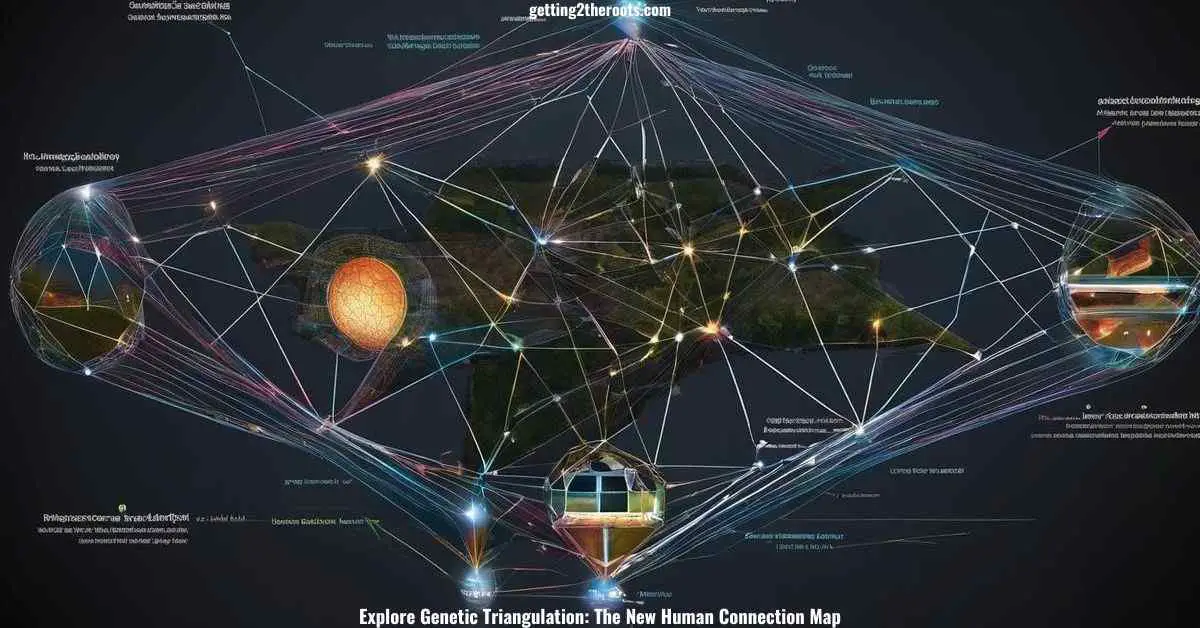
The Future of Genetic Triangulation
Looking ahead, genetic triangulation is poised to reshape vital areas of scholarly pursuit, pushing the boundaries of modern humanity’s understanding of itself.
However, as often accompanies advancements in scientific knowledge, significant challenges loom on the horizon, offering a reminder that with great potential comes formidable responsibility.
Uncovering Human History And Culture
Arguably, the greatest anticipated advancement of genetic triangulation lies in its heuristic potential—the ability to shine an illuminating light on previously unexplored corners of human history, culture, and even biology.
Parsing apart the complex tapestry of human ancestry may lead to fascinating revelations about migration patterns, cultural syncretism, and even evolutionary biology.
It is the potential of this technique to unravel the minutiae of our collective past that could help construct a clear and comprehensive roadmap of our species’ journey, a prospect that fosters an insatiable intellectual curiosity.
Ethical Challenges In Genetic Discoveries
This same potential, however, also presents its greatest challenge. The unveiling of our genetic past via triangulation may lead to ethical dilemmas concerning the preservation of individuality and the respect of privacy rights.
Uncloaking historically protective anonymity could spark socio-cultural implications that demand the astute application of judicious discretion.
How one interprets sensitive findings or potentially contentious information will necessitate meticulous sensitization of the raw data to ensure emotional well-being during such momentous revelations.
Democratizing Access To Genetic Genealogy
In tandem with these considerations is the pressing issue of egalitarian access to genetic genealogy. Innovative scientific advancements often tend to favor those in privileged positions.
Therefore, a commitment to democratizing access to genetic triangulation services is absolutely essential.
This commitment is particularly salient when considering the potential for this technique to unearth historical injustices or validate Indigenous rights claims.

Genetic Triangulation In Law Enforcement
The application of genetic triangulation in law enforcement presents another burgeoning frontier.
While its use in identifying perpetrators of criminal activities could prove a boon to societal well-being, it also necessitates careful navigation of the balance between public interest and an individual’s right to privacy.
Striking this balance requires an unwavering ethical compass and a deep understanding of civil liberties.
Safeguarding Genetic Data
Furthermore, the safety of genetic data is another prominent concern. As the vaults of genetic information grow, so does the risk of data breaches that could yield severe violations of personal privacy.
It is therefore incumbent upon the scientific community to ensure stringent data management practices, reinforcing the fortifications protecting this deeply personal information.
Navigating The Future Of Genetic Triangulation
Thus, as genetic research presses onward into uncharted territory, both promise and complex challenges emerge hand in hand.
The immense potential of genetic triangulation is undoubtedly a beacon of hope for researchers in various fields.
At the same time, it is vital to navigate these inevitable hurdles with a comprehensive ethical toolkit to ensure the harmonious integration of this powerful tool into the next chapter of human self-understanding.
Concluding Thought: Future of Genetic Triangulation
Exploring the realm of genetics and the innovative technique of genetic triangulation opens up a world of possibilities, not just for scientific breakthroughs but for familial understanding as well.
Confidentiality and ethical considerations are crucial components in this field, preventing abuse of sensitive genetic information and fostering responsible, consensual research practices.
As we peer into the future of genetic triangulation, we can see a horizon filled with fascinating complexities, challenges, and advancements.
By appropriately navigating these aspects, we can continue the beneficial application of this procedure in genealogical studies while negating potential setbacks for the growth and deepening understanding of our genetic connections.
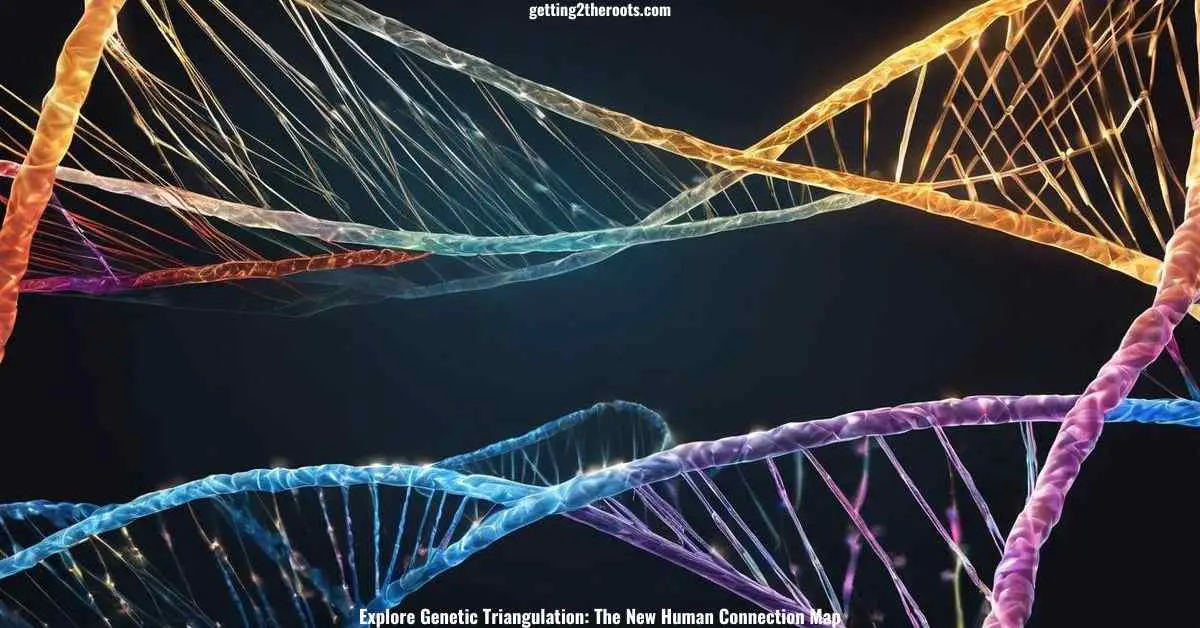
Conclusion
The exploration of genetic triangulation presents a fascinating glimpse into the future of genealogy and genetics.
This technique stands as a beacon of progress, offering profound insights into human history, ancestry, and biological evolution.
While it holds immense potential for scientific discovery, it also brings forth significant ethical considerations, particularly in terms of privacy, socio-cultural impacts, and equitable access.
As we continue to leverage this powerful tool, we must do so with a conscientious approach, balancing the thirst for knowledge with the utmost respect for individual rights and ethical standards.
Genetic triangulation not only illuminates our past but also guides us toward a more informed and responsible future.
Frequently Asked Questions (FAQ) about Genetic Triangulation
1. What is Genetic Triangulation? Genetic triangulation is a method used in genetics to understand complex ancestry by analyzing the DNA from three or more individuals to trace lineage and establish common ancestors.
2. How Does Genetic Triangulation Impact Genealogy? It revolutionizes genealogical research by providing a more nuanced understanding of family trees and ancestry, going beyond direct parental lineage.
3. What are the Ethical Considerations in Genetic Triangulation? Key concerns include privacy rights, handling of sensitive information, socio-cultural implications of uncovered genetic data, and ensuring equitable access to this technology.
4. Can Genetic Triangulation Reveal Historical Injustices? Yes, it can trace lineage to specific populations or regions, potentially illuminating historical injustices and supporting claims like indigenous rights and reparation.
5. Is Genetic Triangulation Used in Law Enforcement? Yes, it’s increasingly used to solve criminal cases and identify victims, but this raises important questions about privacy and ethical use.
